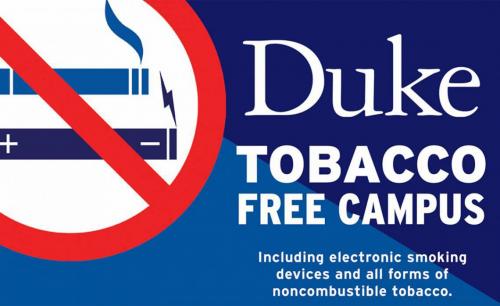

As part of our commitment to the Healthy Duke initiative and to creating a healthy living and working environment, Duke is adopting a new policy to become tobacco-free on all property and grounds owned and leased by Duke University beginning July 1, 2020.
The policy will prohibit the use of all tobacco-based products, including but not limited to cigarettes, cigars, cigarillos, hookahs, chewing tobacco, snuff, and electronic smoking devices such as e-cigarettes, vaping products, and IQOS.
This decision was made after considerable study and engagement with student groups, faculty, and staff. As part of this effort, Duke Stores also discontinued the sale of cigarettes on July 1, 2018.
Want to Quit?
Duke will work with you to create a personalized plan with resources to help you quit.
Are You a Supervisor?
Find additional information and resources to support you in the Manager’s Toolkit.
Duke University Tobacco-Free Initiative
Do you have questions about the Tobacco-Free Campus policy or available treatment resources? Do you need help quitting tobacco? We will be joined by the Director of Quit at Duke, Dr. James Davis, who will be available to answer your questions! If you are a member of the Duke community, this information session is for you. We look forward to sharing the policy and treatment resources with you!
Frequently Asked Questions
When the tobacco-free policy goes into effect on July 1, 2020, smoking or use of any tobacco-based product, including but not limited to cigarettes, cigars, cigarillos, hookahs, chewing tobacco, snuff, and electronic smoking devices such as e-cigarettes, vaping products, and IQOS, will not be allowed on any property or grounds that is owned or solely leased by Duke University.
This policy applies to all students, staff, faculty, contractors, visitors, volunteers, and vendors on property owned or solely leased by Duke University.
No, the policy apply to all electronic smoking devices such as e-cigarettes and vaping-based products, as well as all forms of non-combustible tobacco (chewing tobacco, snuff, etc.).
While tobacco is a legal product for adult use, state law allows that the university may establish rules regarding tobacco use on its property.
The policy doesn’t require that tobacco users quit; they just can no longer use tobacco-based products on campus. We are aware that nicotine is a highly addictive drug. We encourage smokers and users of other tobacco-based products to prepare to address nicotine withdrawal symptoms during the work and school day similar as to what would be required when visiting other tobacco-free environments. FDA approved nicotine replacement such as nicotine patches, gum, lozenges or inhaler are allowed and are encouraged as substitutes for smoking or vaping on campus. Many of these products are provided free-of-charge to the Duke community.
After the policy goes into effect on July 1, 2020, those found smoking, vaping or using other forms of tobacco-based products will be referred for tobacco cessation treatment. Those who do not engage in treatment and continue to smoke, vape or use other tobacco-based products on property owned or leased by Duke will be subject to the same established procedures for any policy violation.
This policy is consistent with the tobacco-free policy implemented by Duke Health, including the School of Medicine and the School of Nursing, in 2007. The same tobacco-free provisions will now cover all property owned or leased by Duke University and Duke Health.
Duke recognizes that nicotine is a dependence and often requires treatment to overcome. The policy is designed to encourage people who smoke within the Duke community to seek and obtain treatment. During the time leading up to the policy effective date (July 1, 2020), a transition team will provide outreach and support to help smokers and other tobacco users to obtain support and treatment to quit.
More information about support resources will be available soon. The Duke Smoking Cessation Program will lead this effort and offer a robust, evidence-based treatment program to support those who want to quit using tobacco-based products. Student Health and Employee Occupational Health & Wellness will also provide support resources to help those who want to quit smoking.
For benefit-eligible Duke faculty or staff, discounted treatment is available using prescribed Chantix or Buproprion or over the counter nicotine replacement therapies (patches, gum or lozenge) to faculty or staff using a Duke health plan (Duke Basic, Duke Select, Blue Care and Duke Options) and their adult dependents on that plan.
Duke students covered by their health plan can make medical appointment through Student Health Services, and nicotine replacement therapy and other treatments that are prescribed can be obtained through the pharmacy with the appropriate insurance co-pay.